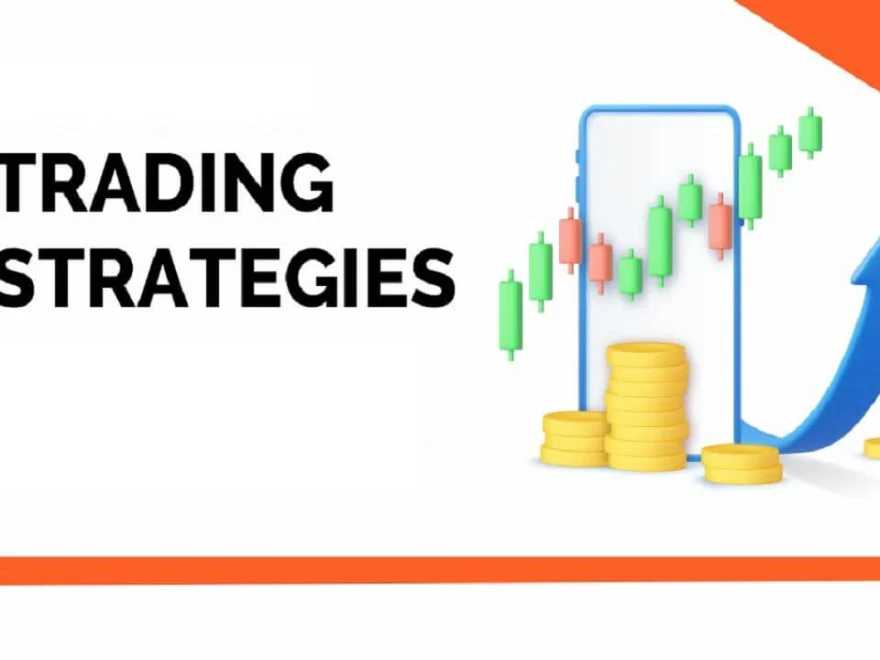Whether you’re just stepping into the world of financial markets or you’re looking to refine your current approach, having a clear trading strategy is essential. With countless options out there, how do you know which one is best suited to your goals and risk tolerance?
In this guide, we’ll explore seven of the most effective trading strategies for 2025. Each method includes pros and cons, time commitment, skill level, and market suitability—so you can decide what fits your trading style best.

Content
What is a Trading Strategies?
A trading strategy is a predefined set of rules or methods used to make buying and selling decisions in the financial markets. These strategies are based on technical analysis, fundamental analysis, or a combination of both.
Having a consistent strategy helps you manage risk, avoid emotional decisions, and improve long-term profitability.
1. Trend Following Strategy
Trend following is all about riding the momentum of the market. Traders identify an existing trend and enter positions in its direction, whether upward or downward.
Pros:
- Can lead to large profits during strong trends
- Works well across multiple asset classes
- Simple to understand
Cons:
- Whipsaw losses in sideways markets
- Requires patience
Market Suitability: Forex, commodities, stocks
Time Commitment: Medium to long-term
Skill Level: Beginner to intermediate
2. Breakout Trading Strategy
This strategy involves entering a trade when the price breaks through a key support or resistance level with increased volume.
Pros:
- Capitalizes on volatility
- Provides clear entry and exit points
Cons:
- Risk of false breakouts
- Requires strict risk management
Market Suitability: Stocks, indices, crypto
Time Commitment: Short to medium-term
Skill Level: Intermediate
3. Swing Trading Strategy
Swing trading aims to capture short- to medium-term price moves over several days or weeks. Traders often use indicators like RSI, MACD, and candlestick patterns to time entries.
Pros:
- More flexible than day trading
- Doesn’t require constant screen time
Cons:
- Exposure to overnight risk
- Requires solid technical analysis skills
Market Suitability: Forex, stocks, ETFs
Time Commitment: Medium-term
Skill Level: Intermediate
4. Scalping Strategy
Scalping is a fast-paced strategy where traders aim to make dozens—or even hundreds—of small trades in a day.
Pros:
- Rapid returns
- Low exposure per trade
Cons:
- High stress
- Requires advanced charting tools and fast execution
Market Suitability: Forex, crypto, futures
Time Commitment: Full-time, intra-day
Skill Level: Advanced
5. Mean Reversion Strategy
Based on the belief that prices tend to revert to their mean over time, this strategy identifies overbought or oversold conditions and places trades accordingly.
Pros:
- Useful in range-bound markets
- Backtestable with historical data
Cons:
- Doesn’t work well during strong trends
- Requires careful selection of indicators
Market Suitability: Stocks, ETFs, indices
Time Commitment: Medium-term
Skill Level: Intermediate
6. News-Based Trading Strategy
This strategy involves trading on economic news, earnings reports, or geopolitical events. Volatility caused by unexpected news can provide significant opportunities.
Pros:
- Potential for quick, large moves
- Capitalizes on market emotion
Cons:
- High risk
- Requires real-time news feeds
Market Suitability: Forex, stocks, commodities
Time Commitment: Event-driven
Skill Level: Advanced
7. Algorithmic Trading Strategy
Algorithmic trading, or algo trading, uses coded strategies to automate trades based on predefined conditions.
Pros:
- Emotionless execution
- Scalable and backtestable
Cons:
- Requires programming knowledge
- Can malfunction in volatile markets
Market Suitability: Equities, futures, forex trading
Time Commitment: Setup-heavy; low maintenance
Skill Level: Advanced
Key Components of Successful Trading Strategies
To build an effective trading strategy, incorporate the following:
- Risk Management: Always define stop-loss and position sizing rules.
- Technical Indicators: Tools like RSI, MACD, and moving averages help identify entries and exits.
- Backtesting: Test your strategy using historical data before going live.
- Discipline: Stick to the plan—no exceptions.
How to Choose the Right Trading Strategy
Ask yourself:
- What is my risk tolerance?
- How much time can I dedicate to trading?
- Do I prefer fast-paced or slower trades?
- What markets am I most comfortable trading?
Answering these questions will help you align with a strategy that fits your personality and goals.
Summary Table: Trading Strategies at a Glance
| Strategy | Time Frame | Risk | Skill Level | Market Suitability |
| Trend Following | Long-term | Medium | Beginner | Forex, commodities |
| Breakout Trading | Short-term | High | Intermediate | Stocks, crypto |
| Swing Trading | Medium-term | Medium | Intermediate | Forex, ETFs |
| Scalping | Intra-day | High | Advanced | Forex, futures |
| Mean Reversion | Medium-term | Medium | Intermediate | Stocks, indices |
| News-Based Trading | Event-driven | High | Advanced | Forex, commodities |
| Algorithmic Trading | Auto-based | Medium | Advanced | Futures, equities |
Best Trading Platform for Your Strategy
Choosing the right trading platform can make or break your strategy. Look for:
- Low spreads & commissions
- Access to advanced charting tools
- Speed and reliability
- Demo account for testing strategies
Final Thoughts
A trading strategies is your blueprint for success. Whether you prefer technical indicators, price action, or event-based triggers, choosing the right approach helps you stay disciplined and consistent.
Want to start risk-free? Open a demo account today and test your preferred strategy in real market conditions.
FAQs
Which trading strategy is best for beginners?
Trend following and swing trading are ideal for beginners due to their simplicity and lower time demands.
Can I combine multiple trading strategies?
Yes, many traders blend strategies depending on market conditions and their trading goals.

Jerald is a blogger with a passion for technology who has been writing about the latest in the world of gadgets and gizmos. They are an avid reader of Science-Fiction novels and love to spend time with their wife and kids.

